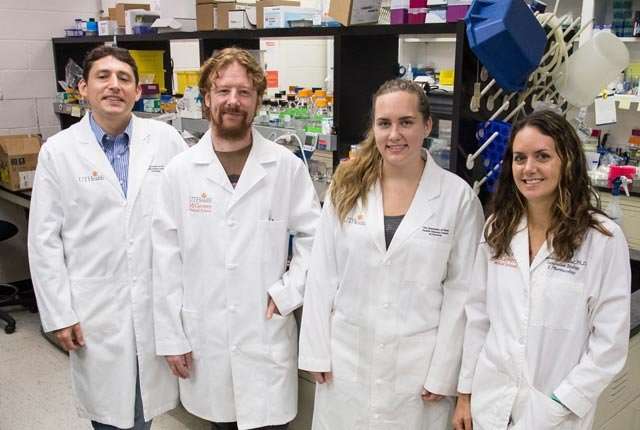Researchers report findings on the effects of fat on stem cells

You really are what you eat—especially when it comes to fats, according to a study this week in the journal Science Advances that was co-authored by Rice University undergraduate Allison Skinkle and colleagues at the Laboratory of Membrane Biology at the University of Texas Health Science Center at Houston's McGovern Medical School.
The study examined how the type of fat a person consumes may determine whether stem cells are converted into bone cells or fat cells. It's the third peer-reviewed journal article Skinkle has co-authored since joining the lab as a freshman and working there for two additional years as part of Rice's Sustaining Excellence in Research (SER) Scholars Program.
"The lab is kind of broad, but overall we like to study the way that properties of membranes affect physiology or cell function," Skinkle said. "It's multidisciplinary. We have physicists, chemists and engineers—a little bit of everything."
The lab is jointly run by Kandice Levental and Ilya Levental, the paper's lead and senior authors, respectively, who are assistant professors in the Department of Integrative Biology and Pharmacology at the McGovern School.
In this new study, the team examined what happens when dietary fats are applied to mesenchymal stem cells, a common type of adult stem cell produced in bone marrow that can grow into many types of connective tissue, including fat, skin, bone and cartilage. The researchers found that dietary fats could remodel cell membranes and affect how stem cells transform into mature tissue cells.
"The fats that we consume, such as cholesterol, unsaturated fats and fish oil, become robustly incorporated into the membrane of our cells and dramatically change the composition and function of those membranes," said Ilya Levental, a Cancer Prevention & Research Institute of Texas (CPRIT) Scholar.
The team measured the lipid content of mesenchymal stem cells as the cells transformed into bone cells or fat cells. They found that bone cell membranes had unique lipids that were particularly high in a type of dietary fat called omega-3 polyunsaturated fat. This fat is also called DHA and is the most abundant component of fish oil, a common dietary supplement. Most importantly, they found that adding such fish oil fats to mesenchymal stem cells pushed them to transform into osteoblasts (bone-forming cells) as opposed to adipocytes (fat-storing cells).
"This fundamental research helps explain why fish oil benefits people with osteoporosis, a bone-weakening disorder affecting an estimated 200 million women worldwide," Levental said. "More broadly, it may provide insight into the many connections between dietary fats and a variety of clinical outcomes, including healthy aging and heart disease."
Skinkle, who worked on the study with the Leventals and four postdoctoral research associates, helped quantify the changes to each type of cell used in the study.
"I would take images and quantify things like matrix deposition or lipid droplet formation in order to quantify how osteogenic or how adipogenic the cells were," she said.
Skinkle plans to earn a Ph.D. after graduating in late 2018, and she credits her time in the Levental lab with her decision to pursue a doctorate and with her choices about what to study in graduate school.
"It's definitely shaped my interests," she said. "I also worked in an immunology lab last summer in Germany. Thanks to my research experiences, I've realized I'm interested in broad principles of biological organization. I think my time in the lab as an undergraduate has given me an understanding of the questions that I'm interested in, and now moving forward, I just have to find a lab and a discipline that will allow me to answer those questions."
More information: Kandice R. Levental et al. ω-3 polyunsaturated fatty acids direct differentiation of the membrane phenotype in mesenchymal stem cells to potentiate osteogenesis, Science Advances (2017). DOI: 10.1126/sciadv.aao1193


















